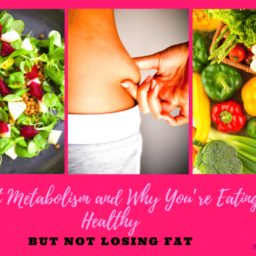Everyone who has struggled to lose weight has tried a diet, even if just for a short time.
However, most diets are not healthy and applicable to everyone.
Instead, why not just develop healthy habits, which you can easily adhere to and allow adapting your diet to any situation.
In this article, we will explain some of these practices that you can adopt and how to implement them in your morning routine for long term weight loss.

- Why creating habits is better than counting calories for long term weight loss
- The morning is a perfect time to hit the scale
- Drinking more water before breakfast can boost weight loss
- The morning breakfast should be higher in protein and lower in carbohydrates
- Create the habit to take your supplements every morning
- Start tracking your food to manage your weight
- Plan your next meals from the morning
- Fit exercise into your morning routine
- Choose the right type of exercises
- Walk in the morning instead of driving
- Go to bed earlier to start your day earlier
- To sum everything up about morning habits for weight loss
Why creating habits is better than counting calories for long term weight loss
Some diets do work for fat loss, some do not, however, there is one simple principle, that determines how effective a diet is going to be – the size of the caloric deficit that it leads to (1).
Even though a lot of these diets claim that they can help you achieve weight loss, without reducing calories, they usually involve some type of restriction – cutting on fat, or carbs, or both, or excluding animal products, etc.
However, this restriction on its own leads to lower energy intake.
This is why one of the most precise ways to be in a deficit without restricting healthy foods is counting calories.
You can precisely determine the amount of energy and macronutrients that you need to consume to stay healthy and lose weight.
However, for a lot of people, this is quite stressful. They find it too taxing, energy-consuming or it might even trigger obsessive-compulsive behaviors and lead to eating disorders.
Although it is a precise method, much less stressful would be simply to create healthy habits, which indirectly lead to reduced energy intake.
In order for them to be effective, you have to be consistent and implement them into your regimen.
Therefore, we have an example of 9 habits that you can incorporate in your morning routine that will result in losing weight.
Take-Away: It is much more sustainable to create healthy habits that will also help you in losing weight, than following a specific diet.
The morning is a perfect time to hit the scale
The morning, right after waking up and doing your morning rituals, and before consuming any food or water, is a great time to hit the scale.
You will be at your lowest possible weight for that day.
There are two main rules when you are aiming to monitor your weight regularly.
Firstly, you should always do it at the same time every day. No better time than the morning, right before consuming any water or food.
Secondly, you have to be consistent and weight yourself daily in order to get a realistic idea of what your results are.
Hitting the scales only twice a week might create the wrong impression that you are not losing weight if you simply have retained more water on the second day.
Instead, do it regularly every morning and you will feel more in control and motivated when you see progress.
It is proven by studies, that consistent self-monitoring is associated with higher weight-loss, improved self-control, and making it much easier to detect weight gain before it escalates (2).
Also, the study suggested that those who do it less frequently are more likely to gain weight.
Another study also associates daily weighting with greater adoption of weight-control behaviors (3).
A six months trial of 47 participants found out that better consistency in self-measuring leads to better long term weight loss.
Take-Away: Regular self-measurements are related to better consistency with your weight management goals and early detection of weight gain.
Drinking more water before breakfast can boost weight loss
Another great morning habit is drinking water before breakfast.
However, it is very often promoted for the wrong reasons.
A lot of internet-gurus and celebrities keep giving advice on medical topics that are completely out of their competence.
Often, they are giving tips on how to detox yourself by using alkaline water, warm water, cold water, water with lemon, etc.
The truth is the only detox happening in your body is the one performed by your liver and kidneys and you cannot control it or improve it.
These organs are already doing their best, so what you can do is to improve your overall health by proper nutrition, being physically active, and maintaining optimal weight.
While the topic of detoxes is completely debunked, the topic of water speeding up metabolism is much more controversial.
While there are multiple studies claiming that drinking more water increases the resting energy expenditure of the body, there is also a lot of evidence suggesting the increase is rather insignificant, if even present at all (4).
The truth is probably somewhere in between – there might be an increase in calories burned, however, it is not something that will significantly impact our long term weight loss results.
On the other hand, studies confirm that drinking water before meals can boost weight loss in other ways.
For example, drinking water prior to breakfast creates volume in the stomach and reduces the energy consumed during the meal in obese adults.
There was an approximate 13% reduction in meal energy intake after drinking half a liter before breakfast, according to a study (5).
Take-Away: Drinking more water, especially before a meal can create volume in the stomach and help you reach satiety faster.
The morning breakfast should be higher in protein and lower in carbohydrates
One of the most common breakfasts for people trying to get fit is oatmeal, usually combined with milk or some type of yogurt.
However, the combination of these foods delivers mostly carbohydrates to the body.
Carbohydrates are an important macronutrient, but they might not be the most suitable breakfast.
It has been scientifically proven that meals rich in carbohydrates and poor in protein raise the levels of tryptophan and respectively – serotonin (6).
While carbohydrates lack tryptophan, the raise in insulin levels lead to decreased blood levels of other amino acids that compete with tryptophan, thus more of it reaches the brain and transforms into serotonin.
This leads to the effects commonly experienced especially after eating something sugary – reduced alertness and performance, and increased sleepiness.
Instead of eating high-carbohydrate meals like oats for breakfast, it is a much better idea to eat high-protein meals.
Not only it will improve your alertness and help you wake up faster, but it also has proven weight-loss benefits.
A study comparing a low and a high-protein breakfast found out that the latter reduces hunger and overall daily intake (7).
Another study found out that a high-protein breakfast reduces post-meal food cravings in overweight and obese adolescents (8).
Another thing that breakfast affects is the hunger hormone called ghrelin. It is secreted by the gastrointestinal tract when the stomach is empty.
The secretion stops when the stomach is stretched. It increases hunger, gastric acid secretion, and gastric motility in order to prepare the body for food intake.
There is compelling evidence associating high-protein breakfast with reduced ghrelin levels and slower stomach emptying (9).
Therefore, a high protein breakfast can help you control your hunger throughout the day and consume fewer calories overall.
Great ideas of high-protein foods for breakfasts are whey protein supplement, eggs, cottage cheese, greek yogurt, protein pancakes or any other high-protein recipe.
Take-Away: Higher intake of carbohydrates in the morning is related to higher levels of serotonin in the brain and induced state of relaxation and reduced alertness. This is why it is better to consume lower-carbohydrate, higher-protein breakfast.
Create the habit to take your supplements every morning
There is a much lower chance to forget taking your daily vitamins and supplements if you create the habit of taking them every morning.
It is not only a good overall habit but also some supplements can aid you in losing weight. Such an example is the supplementation with vitamin D (10).
While the study did not prove that the supplementation itself boosts weight loss, women who reached the recommended blood levels of vitamin D lost much more weight in terms of body fat compared to deficient women.
It is very important that the supplement is taken with a meal, that is rich in fats.
According to studies, the meal being rich in fats boosts the absorption of the vitamin since it is a fat-soluble vitamin (11).
Vitamin D has also other benefits, such as improving bone health, calcium absorption, immune system function and even reducing the risk of some cancers.
Since this is the most common deficit, especially during the winter season, everyone can benefit from its supplementation, but most importantly children in order to prevent the development of rickets.
Take-Away: Certain supplements can also help you in losing weight. Taking them every morning is a great way of making it a habit.
Start tracking your food to manage your weight
According to scientific evidence people tend to underestimate the amount of food they consume (12).
Especially when it comes to snacks, fat and sugar-rich foods.
This is why it is a good idea to track your own food intake in a food diary.
And there is no better time to start listing down your foods than with breakfast. Making it a morning habit will ensure consistency.
Ideally, this way you can track your calories, protein, fat, and carbohydrates.
However, as we mentioned, this is mentally taxing for some people and not suitable for the long term.
Keeping a food journal can be beneficial, not only for tracking quantities but also for identifying unhealthy habits and triggers.
Such habits include snacking too much, lack of protein in the diet, lack of vegetables in the diet, or consuming too much liquid calories.
Evidence suggests that even simpler tracking methods are effective in achieving successful weight management (13).
The study found a positive correlation between the frequency and consistency of food tracking with long-term success in weight loss.
Another study shows that food tracking in the form of food apps and other computerized methods is also an effective method for self-monitoring and leads to greater weight loss (14).
Take-Away: Self-control and self-monitoring are related to higher consistency and success with weight loss goals.
Plan your next meals from the morning
Planning your meals is another strategy to lose excess fat. It will help you not only manage your body weight but also eat healthier overall.
Indeed, it reduces the risk of picking unhealthy or highly caloric foods on the go because you lacked the time or you didn’t have access to healthier food options.
According to studies, the more home-cooked meals we consume, the lower the risk to gain excess weight (15).
There are many healthy and high-protein alternatives that you can prepare at home, such as protein pizza, pancakes, etc.
Another study also found that amongst 40,000 people, meal planning was associated with healthier food choices and reduced incidence of obesity (16).
Meal planning will also help you avoid snacking. Instead, you should pick foods that create sufficient satiety.
It is important when you plan your meals to chose nutrient-dense but not calorie-dense options.
This means including more foods that are rich in vitamins and fiber. Such foods are fruits, vegetables, whole grains, and legumes.
The recommended health standard is at least 400g of fresh fruits and vegetables daily.
Lean meat, fish, seafood, dairy, and eggs can be a good source of quality protein and some additional micronutrients.
On the other hand, foods dense in calories like highly processed ones, sugary, and high-fat meals should be avoided.
Also, liquid meals should not be included in your diet. They do not create sufficient satiety, while some of them like juices and soft drinks are high in calories.
Even some healthy foods like nuts, olive oil, honey should be used sparingly since they are also quite dense in calories.
Take-Away: Planning your meals from the morning or even the previous day can help you avoid unhealthy habits and weight gain.
Fit exercise into your morning routine
A great addition to your morning routine is going to be adding some exercise.
Exercise is going to increase your overall energy expenditure and help you lose weight. However, a lot of people do it wrong.
A widely known myth is that having a cardio workout in the morning before breakfast is the most effective way to burn fat.
One of the reasons for this myth is because there are studies showing it stimulates higher fat mobilization from the fat cells
However, the process of burning fat involves two stages – the release of the fat from mast cells into the bloodstream, and only after that, burning the fats for energy.
Further evidence suggests that in the case of performing cardio before breakfast the oxidation of fats and their use for energy does not increase (17).
Even though mobilization is higher, fats that are not burned for energy go back into the mast cells.
There was no superior effect found when comparing fasted to non-fasted cardio.
Having a small breakfast before any exercise is also proven to be beneficial in terms of post-exercise mood and lower hunger levels throughout the day (18).
Quite the opposite, fasted cardio might even be worse for weight loss in the long-term.
First of all, the energy levels in the morning and before breakfast are quite low for most people.
This will make the cardio session much more stressful and unpleasant, ultimately resulting in lower capacity and effort.
Secondly, it increases the levels of stress hormones which might lead to loss of muscle mass and increased hunger throughout the rest of the day.
Losing muscle increases the risk of the yo-yo effect and eventually regaining the fat.
Take-Away: Doing exercises regularly in the morning can help you boost long term weight loss and improve your daily mood.
Choose the right type of exercises
Skeletal muscles are one of the main drivers of our metabolism.
They make up more than 30% of our body weight and have almost 3 times higher resting energy expenditure than fat tissue (19).
This is why it is much better training in a way that preserves muscle tissue.
While cardio might burn a lot of calories, it is not the best way to achieve long term weight loss.
It is much more efficient to train with weights because it helps with building muscle.
It also adds more variety in your training, thus making it more enjoyable.
However, if you do not have enough time for a full workout in the morning, a great idea is to do some high-intensity interval training.
The intervals in this type of training usually consist of bursts of high-intensity cardio for 20 seconds and 40 seconds recovery periods.
In this way, you can complete an effective workout in just 10-20 minutes.
Take-Away: Performing short but intensive exercises can help you save time in the morning, while most optimal for weight loss is training with weights.
Walk in the morning instead of driving
If you are starting work early in the morning then you might not have time to train properly until the afternoon or in the evening.
Another way to boost your energy expenditure and lose some weight in such cases is choosing to walk instead of driving to your workplace if the distances allow it.
A four-year-long study showed that people who travel regularly to work by car tend to gain more weight, compared to people who walk there (20).
Walking, although being very low-intensity physical activity, improves the total daily energy expenditure and aids weight loss.
Walking is also beneficial for the heart, improves mood, and reduces stress levels.
You can use the time during walking to plan your day and how you are going to achieve your goals.
Take-Away: Taking a walk instead of driving to work, if the distances allow it, is a great way to burn a little more calories every day.
Go to bed earlier to start your day earlier
In order to be more productive, it is good to beat the sun up and start your day early.
It gives you time to wake up, think of your goals for the day, get motivated, and do your routine.
However, you also need to consider getting enough sleep. It is not related only to your overall health, but also to your weight loss goals.
A study comparing the energy intake after 8 hours and after just 4 hours of sleep found out that the sleep deprivation caused the subjects to consume over 500 kcals more on average (21).
That increase in hunger might be due to hormonal changes caused by reduced sleep duration.
Another study involving over 1000 volunteers found out that sleep deprivation is related to elevation in ghrelin and a reduction in leptin levels (22).
As we already mentioned, ghrelin normally gets secreted when the stomach is empty to prepare the organism for food intake. It stimulates hunger.
On the other hand, leptin has the opposite function. It is the hormone that inhibits hunger. Leptin is synthesized by enterocytes as well as fat cells.
Reduced leptin levels and increased ghrelin levels will result in increased hunger throughout the whole day and a higher chance of overeating.
This is why getting enough sleep is just as beneficial as a healthy diet and an increased physical activity.
Take-Away: Getting enough sleep during the night can boost overall mood, reduce hunger, and aid weight loss.
To sum everything up about morning habits for weight loss
The only way to achieve weight loss in the long term is to get rid of your unhealthy habits and replace them with healthy ones.
One of the fastest methods to get used to a new healthy routine is to start every morning with it.
Such habits like having a high-protein breakfast, self-monitoring, exercising, and getting enough sleep are not only healthy but also will improve your weight management.





